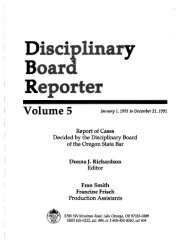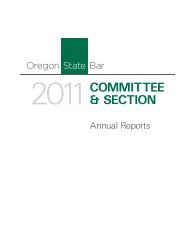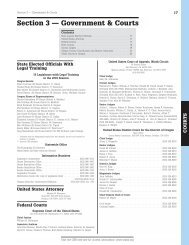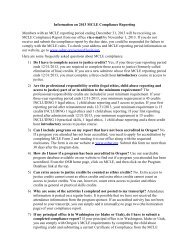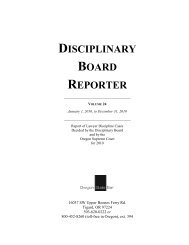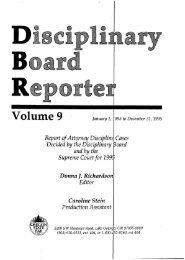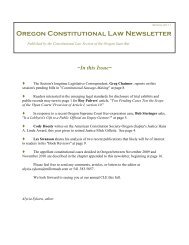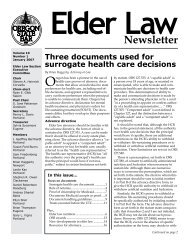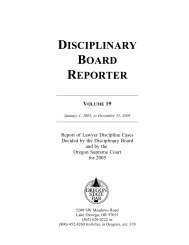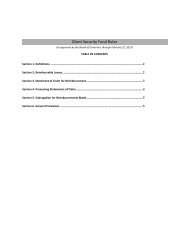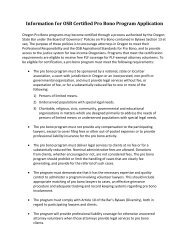February 22, 2013 - Oregon State Bar
February 22, 2013 - Oregon State Bar
February 22, 2013 - Oregon State Bar
Create successful ePaper yourself
Turn your PDF publications into a flip-book with our unique Google optimized e-Paper software.
Relax! You’ll Be More Productive - NYTimes.com<br />
http://www.nytimes.com/<strong>2013</strong>/02/10/opinion/sunday/relax-youll-be-more...<br />
2 of 3 2/11/<strong>2013</strong> 11:19 AM<br />
The Stanford researcher Cheri D. Mah found that when she got male basketball players to sleep 10<br />
hours a night, their performances in practice dramatically improved: free-throw and three-point<br />
shooting each increased by an average of 9 percent.<br />
Daytime naps have a similar effect on performance. When night shift air traffic controllers were<br />
given 40 minutes to nap — and slept an average of 19 minutes — they performed much better on<br />
tests that measured vigilance and reaction time.<br />
Longer naps have an even more profound impact than shorter ones. Sara C. Mednick, a sleep<br />
researcher at the University of California, Riverside, found that a 60- to 90-minute nap improved<br />
memory test results as fully as did eight hours of sleep.<br />
MORE vacations are similarly beneficial. In 2006, the accounting firm Ernst & Young did an<br />
internal study of its employees and found that for each additional 10 hours of vacation employees<br />
took, their year-end performance ratings from supervisors (on a scale of one to five) improved by 8<br />
percent. Frequent vacationers were also significantly less likely to leave the firm.<br />
As athletes understand especially well, the greater the performance demand, the greater the need<br />
for renewal. When we’re under pressure, however, most of us experience the opposite impulse: to<br />
push harder rather than rest. This may explain why a recent survey by Harris Interactive found<br />
that Americans left an average of 9.2 vacation days unused in 2012 — up from 6.2 days in 2011.<br />
The importance of restoration is rooted in our physiology. Human beings aren’t designed to<br />
expend energy continuously. Rather, we’re meant to pulse between spending and recovering<br />
energy.<br />
In the 1950s, the researchers William Dement and Nathaniel Kleitman discovered that we sleep in<br />
cycles of roughly 90 minutes, moving from light to deep sleep and back out again. They named this<br />
pattern the Basic-Rest Activity Cycle or BRAC. A decade later, Professor Kleitman discovered that<br />
this cycle recapitulates itself during our waking lives.<br />
The difference is that during the day we move from a state of alertness progressively into<br />
physiological fatigue approximately every 90 minutes. Our bodies regularly tell us to take a break,<br />
but we often override these signals and instead stoke ourselves up with caffeine, sugar and our<br />
own emergency reserves — the stress hormones adrenaline, noradrenaline and cortisol.<br />
Working in 90-minute intervals turns out to be a prescription for maximizing productivity.<br />
Professor K. Anders Ericsson and his colleagues at Florida <strong>State</strong> University have studied elite<br />
performers, including musicians, athletes, actors and chess players. In each of these fields, Dr.<br />
Ericsson found that the best performers typically practice in uninterrupted sessions that last no<br />
more than 90 minutes. They begin in the morning, take a break between sessions, and rarely work<br />
for more than four and a half hours in any given day.<br />
“To maximize gains from long-term practice,” Dr. Ericsson concluded, “individuals must avoid



